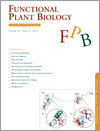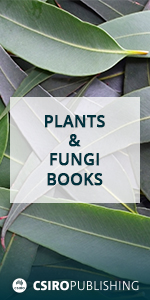
Functional Plant Biology
Volume 45 Number 3 2018
By 2015 genetically modified (GM) crops had been commercialised for 20 years. This technology ranks amongst the most rapidly accepted by farmers, but are there downsides to these introductions? This review considers the advantages and potential disadvantages of GM crops.
FP16444Aquaporin AtTIP5;1 as an essential target of gibberellins promotes hypocotyl cell elongation in Arabidopsis thaliana under excess boron stress
Gibberellins (GAs) promote hypocotyl elongation by controlling the expression of many genes in plants. However, only a few target genes of GAs have been identified to date. The paper provides strong evidence that tonoplast aquaporin AtTIP5;1 mediates GA-stimulated hypocotyl cell elongation under excess boron condition in Arabidopsis. The finding highlights the essential roles of vacuoles and boron in GA signalling in plants.
FP17201Modelling seasonal changes in the temperature-dependency of CO2 photosynthetic responses in two Vitis vinifera cultivars
Interspecific differences in photosynthetic attributes of Chardonnay and Merlot grapevines have been established. The cause of such differences were attributed to a higher carboxylation and regeneration capacity in the Merlot leaves, especially at high temperatures and cultivar differences were exacerbated as the season progressed. Differences in biochemical processes related to assimilation at high temperatures were measured between the cultivars, and these may relate to inherent differences in temperature tolerance between these closely related cultivars.
FP17167Co-inoculation of maize with Azospirillum brasilense and Rhizobium tropici as a strategy to mitigate salinity stress
Salinity is a major factor affecting crop production worldwide. We identified enzymatic and genetic mechanisms in maize that confer tolerance against abiotic stresses when inoculated with plant growth-promoting bacteria. Inoculation with the elite strains identified in this study, of Azospirillum brasilense (Ab-V6) and Rhizobium tropici (CIAT 899) might represent a valuable and sustainable strategy to mitigate salinity stress.
FP17184Protecting cotton crops under elevated CO2 from waterlogging by managing ethylene
Ethylene-induced abscission of young cotton fruits is a major lint yield limiting factor in cotton crop production under stressed environments. Extreme weather events such as long-term soil waterlogging and elevated CO2 can increase fruit loss caused by ethylene production in cotton. Our study showed that the physiological and yield performance of cotton crops under future environments can potentially be improved by mitigating ethylene action.
FP17181NaCl markedly improved the reproductive capacity of the euhalophyte Suaeda salsa
Reproductive growth is very important for plant survival and population establishment under salinity. It remains unknown whether the reproductive process of Suaeda salsa is affected by salinity. NaCl markedly increased the reproductive growth of S. salsa by increasing flower number and fertility. Unravelling the mechanisms of plant salt tolerance will be helpful for improving agricultural production.
FP17225Simulating daily field crop canopy photosynthesis: an integrated software package
Global demand for agricultural product is predicted to surpass our production capacity in the near future, and enhancing plant photosynthesis may be a solution for crop yield improvement. To accelerate enhancement we need to know which target(s) should be manipulated for greatest impact, therefore, a modelling tool has been developed. The tool will be able to improve our understanding of photosynthetic manipulation impacts on crop biomass accumulation, which ultimately affects crop yield.
FP17202The LmSAP gene isolated from the halotolerant Lobularia maritima improves salt and ionic tolerance in transgenic tobacco lines
Abiotic stresses pose serious threats to growth and productivity of crop plants worldwide. We describe the isolation of a novel gene, designated LmSAP, from Lobularia maritime to exploit the potential of this halophyte as a genetic resource to improve salt and ionic tolerance in plants and, particularly, in cereals. These results show that LmSAP is a potentially useful candidate gene for engineering salt and ionic tolerance in cultivated plants.



